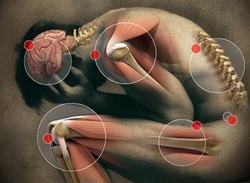
Acupuncture for the Treatment of Chronic Pain
Acupuncture is commonly used for chronic pain, but is what is the evidence for its efficacy? A meta-analysis study from the Memorial Sloan-Kettering Cancer Center suggests that acupuncture is indeed an effective treatment option.
An estimated 3 million American adults receive acupuncture treatment each year, and chronic pain is the most common reason. Despite the number of chronic pain patients using acupuncture, controversy still exists over whether acupuncture has persistent physiological effects in chronic pain management.
A large number of randomized control trials (RCTs) have been conducted to assess the efficacy of acupuncture for chronic pain; however, most have been low quality. A high-quality RCT conducted at the Memorial-Sloan Kettering Cancer Center, with meta-analyses of individual patient data from a total of 17,922 patients, shows that acupuncture is superior to sham acupuncture and no acupuncture for each pain condition (P < .001 for all comparisons). The exclusion of an outlying set of RCTs that strongly favored acupuncture still demonstrates that effect sizes are similar across pain conditions. The pain conditions surveyed were back and neck pain, osteoarthritis, and chronic headache.
Patients receiving acupuncture had scores that were 0.23 (95% CI, 0.13-0.33), 0.16 (95% CI, 0.07-0.25), and 0.15 (95% CI, 0.07-0.24) standard deviations lower than sham controls for back and neck pain, osteoarthritis, and chronic headache, respectively. The effect sizes of acupuncture in comparison to no-acupuncture controls were 0.55 (95% CI, 0.51-0.58), 0.57 (95% CI, 0.50-0.64), and 0.42 (95% CI, 0.37-0.46) standard deviations.
Findings of the meta-analyses indicate that acupuncture is effective for chronic pain and is a reasonable referral option for patients. Additionally, significant differences between true and sham acupuncture indicate that acupuncture is not a placebo. With a growing evidence-base for efficacy, the use of acupuncture for chronic pain will hopefully continue to expand.
Andrew J. Vickers, DPhil; Angel M. Cronin, MS; Alexandra C. Maschino, BS; George Lewith, MD; Hugh MacPherson, PhD; Nadine E. Foster, DPhil; Karen J. Sherman, PhD; Claudia M. Witt, MD; Klaus Linde, MD; for the Acupuncture Trialists' Collaboration Arch Intern Med. 2012;172(19):1444-1453. doi:10.1001/archinternmed.2012.3654
View the whole study
Return to Research News
Acupuncture is commonly used for chronic pain, but is what is the evidence for its efficacy? A meta-analysis study from the Memorial Sloan-Kettering Cancer Center suggests that acupuncture is indeed an effective treatment option.
An estimated 3 million American adults receive acupuncture treatment each year, and chronic pain is the most common reason. Despite the number of chronic pain patients using acupuncture, controversy still exists over whether acupuncture has persistent physiological effects in chronic pain management.
A large number of randomized control trials (RCTs) have been conducted to assess the efficacy of acupuncture for chronic pain; however, most have been low quality. A high-quality RCT conducted at the Memorial-Sloan Kettering Cancer Center, with meta-analyses of individual patient data from a total of 17,922 patients, shows that acupuncture is superior to sham acupuncture and no acupuncture for each pain condition (P < .001 for all comparisons). The exclusion of an outlying set of RCTs that strongly favored acupuncture still demonstrates that effect sizes are similar across pain conditions. The pain conditions surveyed were back and neck pain, osteoarthritis, and chronic headache.
Patients receiving acupuncture had scores that were 0.23 (95% CI, 0.13-0.33), 0.16 (95% CI, 0.07-0.25), and 0.15 (95% CI, 0.07-0.24) standard deviations lower than sham controls for back and neck pain, osteoarthritis, and chronic headache, respectively. The effect sizes of acupuncture in comparison to no-acupuncture controls were 0.55 (95% CI, 0.51-0.58), 0.57 (95% CI, 0.50-0.64), and 0.42 (95% CI, 0.37-0.46) standard deviations.
Findings of the meta-analyses indicate that acupuncture is effective for chronic pain and is a reasonable referral option for patients. Additionally, significant differences between true and sham acupuncture indicate that acupuncture is not a placebo. With a growing evidence-base for efficacy, the use of acupuncture for chronic pain will hopefully continue to expand.
Andrew J. Vickers, DPhil; Angel M. Cronin, MS; Alexandra C. Maschino, BS; George Lewith, MD; Hugh MacPherson, PhD; Nadine E. Foster, DPhil; Karen J. Sherman, PhD; Claudia M. Witt, MD; Klaus Linde, MD; for the Acupuncture Trialists' Collaboration Arch Intern Med. 2012;172(19):1444-1453. doi:10.1001/archinternmed.2012.3654
View the whole study
Return to Research News